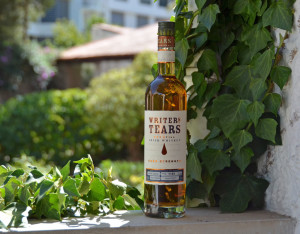By Richard Thomas
Rating: B+
It having been five years since my first look at the cask strength version of one of the best-named whiskeys around, I decided it was time to come around again. Much has happened with the brand during that interval: the makers at Walsh Whiskey formed a partnership to build a distillery; built and opened that distillery; and then parted ways, keeping the brands while giving up the plant.
Writer’s Tears is one of a few blended Irish whiskeys that draw on what are perceived as the better two of the Irish triad of pot still, malt and grain whiskeys, dispensing with the grain whiskey. Given that the Irish whiskey industry resisted the adoption of the Coffey Still and the use of grains other than barley for decades, a choice that contributed to Scotland overtaking them in the whiskey trade, purists see the all-barley, always-made-in-pot-stills styles of malt whiskey and pot still whiskey as being higher quality and more authentic. Jameson draws on all three; certain other blends use malt and grain; a blend like Writer’s Tears uses pot still and malt.
This is the 9th installment of the annual limited release, and this one had a production run of 3,780 bottles, almost double that of the 2014 release I previously reviewed. 1,200 of those bottles went to the U.S., the world’s largest market, and the rest were distributed internationally. The bottling was at 53% ABV, without chill filtration and aged entirely in ex-bourbon barrels.
The Whiskey
A pour of this fairly strong stuff came out as solid gold in the glass. Giving it a swish left a sticky coating.
I found the nose to lead with malted, toasted cereals, a note of honey and a touch of grassiness. Giving the glass ample time to air added a note of cookie spice and into the mix. |The flavor blended the two main aspects of the nose, running strong with malty honey, accented by eucalytpus, ginger and vanilla. The spices plus a trace of wood balance the honeyed and grainy sweetness nicely. The finish lingers in a spicy vein for a spell. Overall, I found this version more malty and less fruity than my previous encounter.
The Price
Expect to pay $150, €130 or £110 for this whiskey.
 The Whiskey Reviewer A World of Whiskey, Poured Every Weekday
The Whiskey Reviewer A World of Whiskey, Poured Every Weekday

